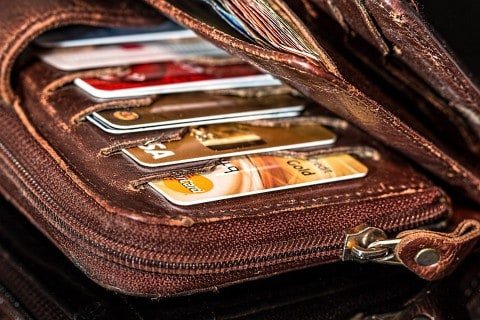When (and How) to Start Building Credit

Building credit and maintaining a good credit score really isn’t too hard once you get started, but it can be an intimidating process — especially when you’re just entering the real world and there’s so many things you’re “supposed” to know that college didn’t prepare you for. Being new to this whole adulthood thing, I’ve just recently begun learning about how to build credit and realized that it’s something I really do need to master now (not five or 10 years down the road). So let’s learn together — here’s when we should start building our credit and how exactly we should go about doing it.
When to Start Building Credit
A lot of people start building their credit in college by opening up a credit card in their name. But just because it’s common doesn’t mean you should do it; it’s like when your mom would ask you if you’d jump off a bridge too just because all your friends were doing it. While sometimes jumping off a the bridge will land you on a soft cloud, other times it could lead to your untimely (financial) death.
The safest time to start building your credit is when you have a steady job to pay the bills (on time). Or if your parents are willing to cosign on loans or are willing to have a credit card under your name but on their dime. But for most of us, it would be easiest to start when we’ll actually be able to pay our bills. If that happens to be your freshman year of college or younger, then more power to you — start building that credit, girl! However, if you know you’re not quite there yet, it would be best not to take on more than you can handle and keep your credit non-existent. (Because keep in mind, no credit is not the same thing as bad credit.)
In short, when you should start building credit largely depends on your financial status — so take some time to really evaluate yourself before diving in.
Ways to Build Credit
How to build your credit is somewhat unique to each individual. The two most common ways to build credit are:
- Opening a line of credit (aka getting a credit card)
- Having bills in your name (like car payments or furniture)
With both of these it’s extremely important that you pay your bills on time each month. Paying bills is by far the most crucial part of maintaining good credit, and not paying on time just one month could blow up years or good behavior (although not all hope is lost because there’s always time to recover).
Let’s say you have trouble controlling your spending (and there’s no shame in admitting it), and you don’t think you’d be able to keep from racking up a huge bill if you got a credit card but you also want to start building your credit. If this sounds like you, you might want to look into a secured credit card. A secured credit card is basically a credit card with training wheels. The way it works is that you put a deposit down upfront — let’s go with $300. If you put $300 down, then you’ll get $300 worth of credit on your card — same if you put $400 or $500 down.
This is helpful when you’re trying to build your credit (especially in college or in your early twenties) because it restricts your spending — so there’s literally no chance of you ending up in thousands of dollars worth of debt. While you definitely don’t want to keep a secured credit card forever because they have higher annual fees and interest rates, it’s the perfect place to start building credit.
Building credit is actually one of the easiest adult things to figure out (especially when compared to doing your taxes and learning how to invest). Pretty much all you need to do is pay your bills, in full, on time, each month. If you sign up for a credit card, be sure you have the money for it — and I highly recommend going on the secured credit card route if you have trouble controlling your spending. While one mistake can cost you big time, and the stakes are high, you’ll be just fine as long as you stay on top of things. Best of luck!
Last modified on July 16th, 2019










Show Comments +